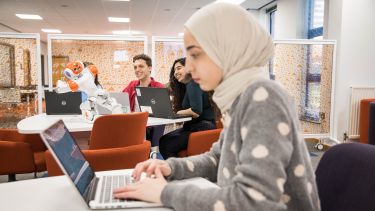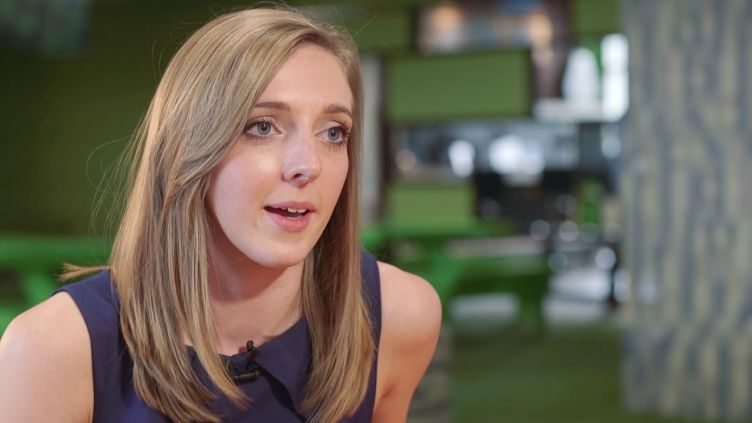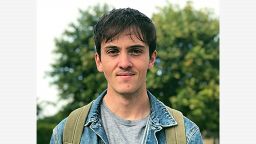Computer Science with a Foundation Year BSc MComp
If you want to study computer science but don't meet our standard entry requirements, our foundation year could be for you. You'll learn the fundamentals of maths, physics and engineering in a variety of innovative ways to prepare you for your degree.
-
A Levels
BBB; BBC -
UCAS code
G401 -
Duration
5 years -
Start date
September
- Accredited
- Course fee
- FY Foundation year
- Funding available
Explore this course:
This course is no longer taking applications for 2025-26 entry. View 2026-27 entry or find another undergraduate course.
Course description
Why study this course?
Professional, communication and presentation skills help to create more employable computer scientists and software engineers.
You'll have access to the latest hardware, software and operating systems, plus high-spec graphics computers and a robotics arena in our dedicated computer labs in The Diamond.
Our dedicated student welfare advisor is available to provide support, for example, if you are feeling down, overwhelmed or struggling to adjust to student life.

Understand theoretical issues underlying a problem, and engineer a solution with this comprehensive degree in computer science.
In this ever-evolving field there is no shortage of subjects to explore. You’ll be encouraged to experiment with speech recognition, voice synthesis, text summarisation, translation… to name a few.
As well as learning to program and think analytically, you'll be encouraged to work in teams and develop your communication skills. And from year two, you’ll work as part of a team to solve real problems set by real clients.
The main focus of your final year is a dissertation project, where you’ll enjoy scope for creative and intellectual exploration. You'll also have the opportunity to choose from a large selection of modules spanning theoretical and applied computer science, AI and software engineering approaches taught by research leaders in their field.
This BSc course is accredited by the British Computer Society. The courses fully meet the requirements for Chartered Information Technology Professional and partially meet the requirements for Chartered Engineer.
The MComp course is accredited by the British Computer Society. The courses fully meet the requirements for Chartered Information Technology Professional and Chartered Engineer.
Modules
UCAS code: G401
Years: 2022, 2023, 2024
Core modules:
- Introduction to Engineering
-
This module will introduce the application of engineering principles to foundation year students and give the student an appreciation of the breadth of engineering activities across the faculty and identify to students what knowledge areas and skills are needed in order to contribute to their development and be successful. It will also help create links with departments and draw on the other modules that students will take in the foundation year especially maths and physics.
40 credits - Foundations of Physics with Computing
-
This module will introduce essential concepts in mechanics and electronics in the context of computer science, to develop an understanding of real world interactions with electro-mechanical devices and producing simplified programming code.
30 credits
- Further Foundation Mathematics
-
The syllabus for MAS004 covers important material which appears on the A level maths and further mathematics A Level curriculum. The module is for students who are taking MAS003 and need a deeper background in mathematics for their degree course. The module covers advanced principles of algebra, geometry and calculus. Following the introduction of new material, students have the opportunity of extensive problem solving, both in the problem classes with tutors and in their own time.
10 credits
Optional Modules. You can choose one of the following.
- Core Foundation Mathematics
-
The syllabus for MPS002 covers the common core A Level curriculum. The unit is tailored for students who have been away from mathematics for a period of time, but who will have gained some A-Level or similar qualifications. The unit covers the basic principles of algebra, geometry and calculus. Following the introduction of new material in the lectures, students have the opportunity of extensive problem solving, both in the tutorial sessions with the lecturers and in their own time.
40 credits - Foundation Core and Enhanced Mathematics
-
This module builds on the common core curriculum from A level maths (which is a prerequisite). This unit covers enhanced comprehension of topics in pure maths, statistics, probability, and numerical methods. These topics are chosen to further prepare students for their undergraduate studies in the science and engineering faculties.
40 credits
After successfully completing the foundation year, you can start your BSc or MComp degree.
Explore computer science courses
The content of our courses is reviewed annually to make sure it's up-to-date and relevant. Individual modules are occasionally updated or withdrawn. This is in response to discoveries through our world-leading research; funding changes; professional accreditation requirements; student or employer feedback; outcomes of reviews; and variations in staff or student numbers. In the event of any change we will inform students and take reasonable steps to minimise disruption.
Learning and assessment
Learning
Learning will be delivered through a combination of lectures, practical sessions, tutorials and seminars. You will also learn important group work skills and will have the opportunity to work with clients to solve real-world problems. As well as formal teaching you will be expected to undertake independent study.
Assessment
You will be assessed by a combination of exams and tests, coursework and practical work. The proportions for each will vary depending on the modules you choose.
Programme specification
This tells you the aims and learning outcomes of this course and how these will be achieved and assessed.
Entry requirements
The A Level entry requirements for this course are:
BBB; BBC
BBB (any A Level); BBC including Maths and at least one of Physics, Chemistry or Biology
- International Baccalaureate
- 32 (any subjects); 31, with Maths and at least one of Physics, Chemistry or Biology at Higher Level 5 or Standard Level 7
- BTEC Extended Diploma
- DDD in Engineering or IT + GCSE Science grade 6/B and Maths grade 7/A
- BTEC Diploma
- DD in Engineering or IT + A at A Level (no STEM at A Level) + GCSE Science grade 6/B and Maths grade 7/A; DD in Engineering or IT + B in an A Level science subject (Physics, Chemistry, or Biology) + GCSE Maths grade 7/A; DD in Engineering or IT + C in A Level Maths + GCSE Science grade 6/B
- T Level
- Distinction in the Digital Production, Design and Development T Level, including grade B in the core component + GCSE Science grade 6/B and Maths grade 7/A
- Scottish Highers
- AABBB (any subjects); ABBBB including Maths and at least one of Physics, Chemistry or Biology
- Welsh Baccalaureate + 2 A Levels
- B + BB (any A Level subjects); B + BC in Maths and either Physics, Chemistry or Biology
- Access to HE Diploma
- Award of Access to HE Diploma in a relevant subject, with 45 credits at Level 3, including 24 at Distinction (to include 12 Maths units), and 21 at Merit + GCSE Maths grade 7/A
-
If you are studying any other subject combination, we require GCSE Science grade 6/B (or 65 in GCSE Double Award Science) and Maths grade 7/A
You must demonstrate that your English is good enough for you to successfully complete your course. For this course we require: GCSE English Language at grade 4/C; IELTS grade of 6.5 with a minimum of 6.0 in each component; or an alternative acceptable English language qualification
Equivalent English language qualifications
Visa and immigration requirements
Other qualifications | UK and EU/international
Due to the competitive nature of applying for the course, meeting the minimum entry requirements does not guarantee an offer. All applicants up to 29 January 2025 will be considered, ranked and offers made after this date. Late applications will not be considered.
If you have any questions about entry requirements, please contact the school/department.
Graduate careers
School of Computer Science
Some of our graduates have gone on to become IT consultants, software engineers, software developers, project managers, and data scientists in companies such as Amazon, ARM, BT, Bank of America & BofA Securities, Goldman Sachs, Google, IBM, Microsoft, and Plusnet. Others have begun their research careers by starting a PhD.
School of Computer Science
National Student Survey (NSS) 2024
The Times and Sunday Times Good University Guide 2025
Research Excellence Framework 2021

Here in Sheffield our world-class research is advancing our understanding of computer science, and leading to practical applications that are enhancing people’s lives. From cutting-edge artificial intelligence that could transform dementia treatment, to text engineering methods that fight the spread of disinformation online, our research is delivering tremendous impact.
Many of our lecturers are leading computer scientists with international reputations, and their research shapes and inspires what you will be taught. This means that what we teach you at Sheffield is right up to date. Also, through a research-led education we hope to inspire a sense of creativity and curiosity that will set you on a life-long path of learning and discovery.
As well as our first-class teaching, the hands-on practical skills and industry experience you’ll gain in Sheffield will pave the way for an exciting career. Every year our students go on to work for some of the biggest and most innovative companies in the world.
We teach using industry-standard tools so that you can hit the ground running, and we also help you to develop the problem solving and communication skills that employers really value. We also prepare you for making decisions that will affect others: it’s crucial that as a computer science professional you understand the ethical implications of your work and are mindful of its environmental impact.
Our school is a vibrant, diverse and supportive community of like-minded people. If you decide to join us at Sheffield, you’ll be welcomed as part of that community and presented with a multitude of opportunities for extracurricular activities. That is why studying in our school is an excellent investment in your future, whatever path you choose.
Your lectures, practical classes, tutorials and seminars are usually held on the University campus. The Diamond is a world-class building, home to all engineering undergraduates and where most of your practical sessions will take place. Our investment of £81m in the building and £20m for lab equipment is helping us to develop innovative teaching and learning experiences.
Dedicated teaching staff will support you and assist your development into a computer scientist of the future. We regularly host guest lectures from industry, with recent guests including Microsoft, Google, GitHub, IBM and ARM.
Facilities
We use a multitude of cutting edge hardware in our teaching. We have MiRo robots and Robotis turtlebots which are used to teach robotics and programming. These are also used in third year dissertation projects.
We have facilities and equipment exclusively for software development on mobile devices including phones and tablets.
As a computer science student within the Faculty of Engineering, you will have access to specialist facilities in our state-of-the-art hub, The Diamond. Here you will have access to the latest hardware, software and operating systems in our dedicated computer labs. Virtual Reality facilities, high-spec graphics PCs, a robot arena, media editing suites and video and podcast recording studios are all available.
Take one of our MComp or MEng degrees and you will have the opportunity to work in Genesys Solutions, the first student-run software development organisation in the UK, where you will pitch, develop and market ideas for a startup company.
University rankings
Number one in the Russell Group
National Student Survey 2024 (based on aggregate responses)
92 per cent of our research is rated as world-leading or internationally excellent
Research Excellence Framework 2021
University of the Year and best for Student Life
Whatuni Student Choice Awards 2024
Number one Students' Union in the UK
Whatuni Student Choice Awards 2024, 2023, 2022, 2020, 2019, 2018, 2017
Number one for Students' Union
StudentCrowd 2024 University Awards
A top 20 university targeted by employers
The Graduate Market in 2024, High Fliers report
A top-100 university: 12th in the UK and 98th in the world
Times Higher Education World University Rankings 2025
Student profiles
Fees and funding
Fees
Additional costs
The annual fee for your course includes a number of items in addition to your tuition. If an item or activity is classed as a compulsory element for your course, it will normally be included in your tuition fee. There are also other costs which you may need to consider.
Funding your study
Depending on your circumstances, you may qualify for a bursary, scholarship or loan to help fund your study and enhance your learning experience.
Use our Student Funding Calculator to work out what you’re eligible for.
Visit
University open days
We host five open days each year, usually in June, July, September, October and November. You can talk to staff and students, tour the campus and see inside the accommodation.
Subject tasters
If you’re considering your post-16 options, our interactive subject tasters are for you. There are a wide range of subjects to choose from and you can attend sessions online or on campus.
Offer holder days
If you've received an offer to study with us, we'll invite you to one of our offer holder days, which take place between February and April. These open days have a strong school focus and give you the chance to really explore student life here, even if you've visited us before.
Campus tours
Our weekly guided tours show you what Sheffield has to offer - both on campus and beyond. You can extend your visit with tours of our city, accommodation or sport facilities.
Apply for this course
This course is no longer taking applications for 2025-2026 entry. View 2026-2027 entry or find another undergraduate course.The awarding body for this course is the University of Sheffield.
Recognition of professional qualifications: from 1 January 2021, in order to have any UK professional qualifications recognised for work in an EU country across a number of regulated and other professions you need to apply to the host country for recognition. Read information from the UK government and the EU Regulated Professions Database.
Any supervisors and research areas listed are indicative and may change before the start of the course.





